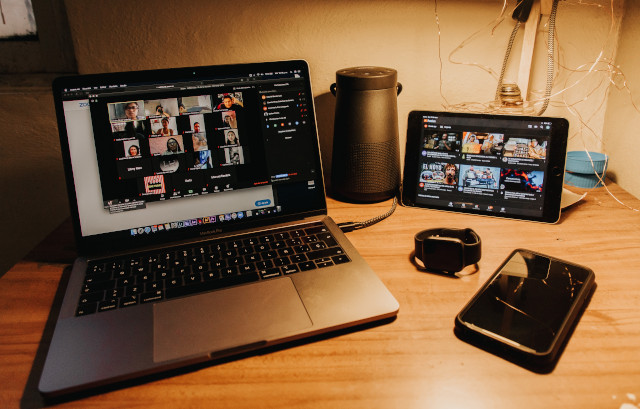
Photo by Kyle Glenn on Unsplash
The trend for this post is leaders leaving. AT&T CEO Randall Stephenson is stepping down, John Legere resigns from the T-Mobile board (completely cutting ties), and SAP dropped the co-CEO model a few months after starting it.
Companies are pivoting for the times ahead and certain leaders have other options or just don’t want to deal with the headaches of day-to-day operations (see Disney’s Bob Iger).
Meanwhile, IT news is shifting back to normal… more talk about cloud and AI and less about Zoom and security concerns.
Artificial Intelligence/Robotics
- Pope Joins Forces with IBM, Microsoft to Develop Artificial Intelligence (AI)
Pope Francis threw his support behind the development of AI during a speech that was read on his behalf at a conference that was attended by Microsoft president Brad Smith and IBM Executive Vice President John Kelly. At that time, the pope was sick and was unable to deliver the speech himself.
The joint document specifically referenced the potential abuse that can occur with facial recognition technology.
“New forms of regulation must be encouraged to promote transparency and compliance with ethical principles, especially for advanced technologies that have a higher risk of impacting human rights, such as facial recognition,” the document stated.
Cloud
- Google’s Thomas Kurian on COVID-19, customers in crisis and the big cloud fight
This is a little dark, but it seems like it’s going to be a good shopping opportunity. There’s going to be a lot of companies that don’t come through this, or don’t come through this at the same level that they were at six months ago.
Over the last year, if you look at what we’ve said repeatedly, yes, we need a very clear, crisp product strategy. I think the feedback we’ve received from customers, from partners has shown that we have now clarified our product strategy. So if we were to do acquisitions, they know how it complements our footprint.
We’ve also scaled our go-to-market organization significantly, with credit to Rob Enslin and his team. They’ve done a great job and to be honest with you, a lot of examples of customers I gave you [above] were illustrative of the reach that we now have through our customer service and sales organization to help customers through this.
We continue to work with partners to bring them business. One of the things that we’ve always felt is that the best partnerships are tested during a difficult period, and we remain committed to bringing as much business as we can to the partner community.
As I said, we’re not ruling in or out any acquisition discussion. We don’t need acquisitions to grow; you’ve seen our growth rates. Nor are we saying we won’t do anything, because it would not make sense to make such a public statement.
https://www.protocol.com/interview-with-google-cloud-ceo-thomas-kurian
- IBM First-Quarter Sales Decline as New CEO Aims to Revive Growth
International Business Machines Corp. IBM 0.24% posted lower first-quarter sales, withdrew annual earnings guidance because of uncertainty caused by the coronavirus pandemic and took a large restructuring charge, highlighting the challenges new Chief Executive Arvind Krishna faces in trying to revive Big Blue’s fortunes.
IBM on Monday said it was withdrawing full-year earnings guidance that included generating at least $13.35 in adjusted earnings per share, citing the Covid-19 crisis. The company said it would reassess the situation at the end of the current quarter.
“It was a tough decision to withdraw guidance,” Mr. Krishna told analysts. “But these are unprecedented times, and this quarter is not the time to declare we have clarity—that does not benefit us, and it does not benefit you as investors and analysts.”
- Amazon Is Running Out of Ways to Stop Microsoft’s JEDI Deal
Between the fourth quarters of 2018 and 2019, AWS’s share of the global cloud platform market dipped from 33.4% to 32.4%, according to Canalys, while Azure’s market share jumped from 14.9% to 17.6%.
Azure is growing faster for three main reasons: It’s tightly tethered to Microsoft’s other services, it’s increasingly popular with retailers that have been burned by Amazon, and it’s cheaper for Windows Server and SQL Server users, who are granted prices for “bundled” licenses instead of stand-alone services.
AWS generates most of Amazon’s operating profits and supports the growth of its lower-margin marketplaces. If Azure keeps pulling customers away from AWS, Amazon’s profit growth could decelerate — which would leave it less room to expand its e-commerce ecosystem with loss-leading strategies.
AWS generated $35 billion in revenue, or 12% of Amazon’s top line, in 2019. Assuming the JEDI contract pays out $1 billion annually over the next 10 years, it would only lift its AWS revenue by less than 3%.
https://www.fool.com/investing/2020/04/22/amazon-running-out-ways-stop-microsoft-jedi-deal.aspx
Software/SaaS
- Fishtown Analytics raises $12.9M Series A for its open-source analytics engineering tool
“I wrote this blog post in early 2016, essentially saying that analysts needed to work in a fundamentally different way,” Fishtown founder and CEO Tristan Handy told me, when I asked him about how the product came to be. “They needed to work in a way that much more closely mirrored the way the software engineers work and software engineers have been figuring this shit out for years and data analysts are still like sending each other Microsoft Excel docs over email.”
The dbt open-source project forms the basis of this. It allows anyone who can write SQL queries to transform data and then load it into their preferred analytics tools. As such, it sits in-between data warehouses and the tools that load data into them on one end, and specialized analytics tools on the other.
- Another pandemic woe: Zoom fatigue
We’re using it for everything now. It would be one thing if we only used Zoom for team meetings and one-on-ones at work. But Zoom is now the go-to tool for informal social gatherings and virtual happy hours, family events and religious services, not to mention kids’ online classes, doctors’ appointments and perhaps a therapy session to process it all.
Videoconferencing imposes cognitive and psychological frictions and aggravates social anxieties. As experts in human-computer interaction point out, using Zoom means putting on a show for others without being able to rely on the cues we primates depend on in physical encounters.
Other
- SAP Drops Co-CEO Structure to Simplify Leadership During Pandemic
SAP said Co-CEO Jennifer Morgan, 48 years old, would leave the company on April 30.
“More than ever, the current environment requires companies to take swift, determined action which is best supported by a very clear leadership structure,” SAP said in a written statement. “Therefore, the decision to transfer from Co-CEO to sole CEO model was taken earlier than planned to ensure strong, unambiguous steering in times of an unprecedented crisis.”
Christian Klein, 39, would stay on as sole CEO, SAP said late Monday in New York.
Ms. Morgan, who is American, joined SAP in 2004 and ran the company’s cloud-computing business before being elevated last year to co-CEO. Mr. Klein, who is German and joined SAP in 1999 as a student, served as chief operating officer before his co-CEO appointment.
- John Legere abruptly resigns from T-Mobile board of directors ‘to pursue other options’
“Mr. Legere noted that he was not resigning because of any disagreement with management or the board on any matter,” T-Mobile said in its note, which also contained a quote from Legere addressed to the company and its employees:
In his notice to the company, Mr. Legere stated “It has been a privilege and honor to have led T-Mobile as CEO for the past seven and a half years and served on the Board of Directors. And although I will be leaving the Board just a few weeks earlier than planned, be assured that I remain T-Mobile’s #1 fan!”
Whatever Legere has planned next, apparently it couldn’t wait another month and change.
https://www.theverge.com/2020/4/24/21235226/john-legere-resigns-tmobile-board-directors
- AT&T CEO Randall Stephenson to step down, COO Stankey to take over
AT&T announced Friday that CEO Randall Stephenson will retire and will be succeeded by President and COO John Stankey on July 1, months earlier than expected.
Stephenson, 60, said in February he would remain CEO for the rest of the year, though he refused to project beyond that date. He will remain executive chairman of the board until January. AT&T shares were largely unchanged following the announcement.
Stankey, who was being groomed as Stephenson’s successor over the last couple years, recently dropped his position as CEO of AT&T’s WarnerMedia, which will soon be led by Hulu co-founder Jason Kilar.
https://www.cnbc.com/2020/04/24/att-ceo-randall-stephenson-to-step-down.html





